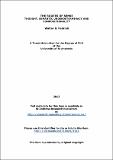Files in this item
The routes of sense : thought, semantic underdeterminacy and compositionality
Item metadata
| dc.contributor.advisor | Greenough, Patrick | |
| dc.contributor.author | Pedriali, Walter B. | |
| dc.coverage.spatial | xv, 247 | en_US |
| dc.date.accessioned | 2012-09-22T20:13:58Z | |
| dc.date.available | 2012-09-22T20:13:58Z | |
| dc.date.issued | 2012 | |
| dc.identifier.uri | https://hdl.handle.net/10023/3142 | |
| dc.description.abstract | What does it mean to be a rational language user? What is it to obey linguistic rules? What is the proper account of linguistic competence? A Fregean answer to these questions would make essential appeal to the notion of sense: we are masters of a language to the extent that we are able to recognise the cognitive value of its expressions; we are rational judges regarding truth-value assignments to the extent that we are sensitive to the ways in which the sense of an expression guides us in the semantic evaluation process; and as for obeying rules, it is our ability to respond to how sense directs us, for a particular assertion of a sentence, towards the determination of its truth-value that best exemplifies what it is like to follow a linguistic rule. My thesis explores a cluster of closely interrelated issues arising from these questions (whether or not considered from a Fregean perspective). Accordingly, in tracing the routes of sense my dissertation places itself at the intersection of the philosophy of language, linguistics, philosophy of logic, and meta-ethics—and indeed, I end up agreeing with Allan Gibbard that the theory of meaning really belongs to meta-ethical reflection. Chapter 1 introduces some of the main research questions that I try to address in the rest of the thesis. In chapter 2 I state a number of theses which I take to be the defining ones for semanticism. I show that they form a class of jointly incompatible commitments. I choose nonsense as a problem case for compositionality and I argue that it forces the semanticist to abandon either the learnability or the compositionality constraint. The escape route I adopt, going radically minimalist about content, is incompatible with another key semanticist thesis, namely, that grasp of meaning is grasp of truth-conditions (robustly conceived). In chapter 3, I consider the account of atomic meanings given by both the semanticist and the pragmaticist and I conclude that on neither account does interpretation come out as a process of rational choice between candidate bearers of content. Again, I suggest the lesson from indeterminacy is that we ought to embrace an ineradicably minimal conception of content. In chapter 4 I turn my attention to the meaning of the logical constants and I argue that indeterminacy worries extend to the very heart of the compositional machinery. Chapter 5 examines the view that logic is the science of reasoning. Unsurprisingly, I conclude that a defence of this claim requires endorsing content-minimalism. In chapter 6 I conclude my dissertation by sketching a radical view of content minimalism and I try to show how it can solve the puzzles I had been considering over the course of the previous chapters. | en_US |
| dc.language.iso | en | en_US |
| dc.publisher | University of St Andrews | |
| dc.subject.lcc | B840.P4 | en_US |
| dc.subject.lcsh | Semantics (Philosophy) | en_US |
| dc.subject.lcsh | Language and languages--Philosophy | en_US |
| dc.subject.lcsh | Linguistics | en_US |
| dc.subject.lcsh | Logic | en_US |
| dc.subject.lcsh | Metaethics | en_US |
| dc.subject.lcsh | Compositionality (Linguistics) | en_US |
| dc.title | The routes of sense : thought, semantic underdeterminacy and compositionality | en_US |
| dc.type | Thesis | en_US |
| dc.type.qualificationlevel | Doctoral | en_US |
| dc.type.qualificationname | PhD Doctor of Philosophy | en_US |
| dc.publisher.institution | The University of St Andrews | en_US |
This item appears in the following Collection(s)
Items in the St Andrews Research Repository are protected by copyright, with all rights reserved, unless otherwise indicated.

